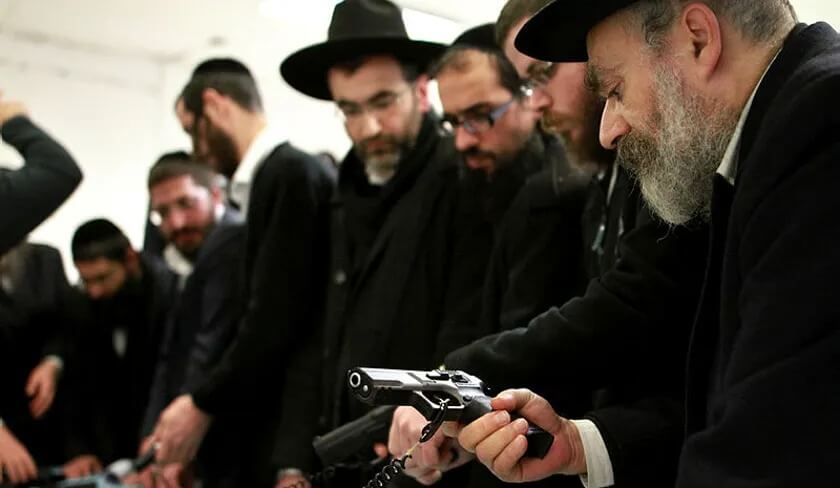Israel’s ultra-Orthodox are carrying more guns, but not everyone thinks it’s kosher
Following deadly terror attacks, Israel’s ultra-Orthodox community is debating the merits of gun ownership, leading to a significant increase in applications for gun permits

Graphic by Angelie Zaslavsky
This article originally appeared on Haaretz, and was reprinted here with permission. Sign up here to get Haaretz’s free Daily Brief newsletter delivered to your inbox.
Despite belonging to a subculture which generally eschews weapons and military service, members of Israel’s ultra-Orthodox community are now debating the merits of gun ownership following a series of deadly terror attacks which have sparked a significant increase in applications for gun permits across the country.
In the wake of the attacks, Rabbi Sinai Halberstam, a rabbinical advisor for the Bnei Brak chapter of United Hatzalah, instructed all of the first responder organization’s members in the predominantly ultra-Orthodox city who have gun permits to begin carrying their weapons with them at all times, including during synagogue services on Shabbat.
“In light of the many warnings and the sensitive situation that we currently find ourselves in, it is a positive commandment (Mitzvah) and obligation for anyone authorized to do so from the volunteers of the Bnei Brak branch to carry their weapons with them even on Shabbat and holidays and especially when going to the synagogue,” Halberstam argued, explaining that a house of worship “can be a place that is targeted due to many people congregating there.”
Last March, a Palestinian gunman carried out a shooting spree in Bnei Brak and ultra-Orthodox news site Behadrei Haredim has reported that the Israel Police are actively discussing arming the sextons of the city’s synagogues as part of a pilot which could later be expanded nationally.
More recently, three people, including two small children, were killed in a ramming attack in Jerusalem’s Ultra-Orthodox Ramot neighborhood, an incident which itself came on the heels of a shooting near a synagogue in Neve Yaakov, in which seven Israelis were killed.
Those attacks, in turn, followed a November double bombing in Jerusalem in which 15-year-old Israeli-Canadian yeshiva student Aryeh Shechopek was killed.
Periods of heightened violence usually lead to an increase in applications for permits and the Security Cabinet last month decided to expand the granting of licenses and speed up the procedures for receiving them – a move that will allow thousands more to carry weapons.
“Pretty much the entire chapter of Neve Yaakov has now requested a license,” United Hatzalah Raphael Poch told Haaretz on Tuesday.
“I know that there has been a rise in requests both in Neve Yaakov, other ultra-orthodox communities in Jerusalem and in Bnei Brak,” he said, cautioning that he could only speak about his organization’s volunteers and “not the entire community as whole.”
One of those currently applying for a gun license is Daniel Katzenstein, the director of the organization’s psycho-trauma response team and one of the responders present during the aftermath of the Neve Yaakov shooting.
The ultra-Orthodox immigrant from Texas said that he was not aware of any barriers to gun ownership in Jewish law, although many members of the community, which encourages large families, are likely concerned about the possibility of accidental discharges in “homes with many children.”
According to data provided by the National Security Ministry, ultra-orthodox communities and Arab towns are at the bottom of the list of legal gun ownership. The Jewish municipality where the number of gun license holders is the lowest is the city of Bnei Brak, with 0.32 percent (394 residents out of a population of more than 200,000).
However, not everybody in the ultra-Orthodox community is behind the idea of arming their constituents.
According to Behadrei Haredim, Modi’in Illit municipal Rabbi Meir Kessler declared in a public speech over the weekend that “an avreich,” or married man who learns full-time in yeshiva, “does not carry a weapon” because doing so could have a negative effect on his faith.
Only 0.75 percent of adults in Modi’in Illit carry weapons.
Many members of the ultra-Orthodox community do not serve in the armed forces because of a belief that their Torah study serves to protect them, an attitude which may extend to gun ownership more generally, explained Dr. Gilad Malach, a researcher at the Israel Democracy Institute.
“I’m not familiar at all with anybody who says we don’t need the army or police at all, but [they will say] ‘our role is to study Torah and to pray and to do our best in the spiritual field,’” he said, noting that while there are haredi rabbis who support arming their constituents, others, from more hardcore groups, may see doing so as “giving legitimacy” to enlistment as an alternative to full-time Talmud study.
“It’s an ideologically problematic position for some who are against the army and army service,” he said.





















